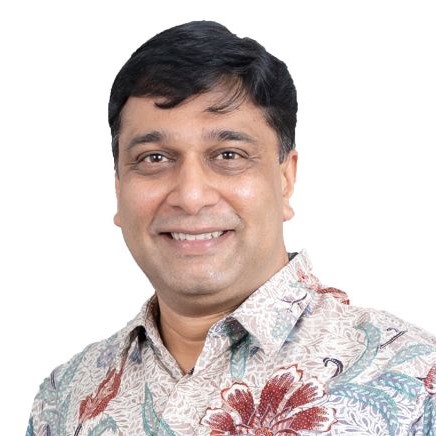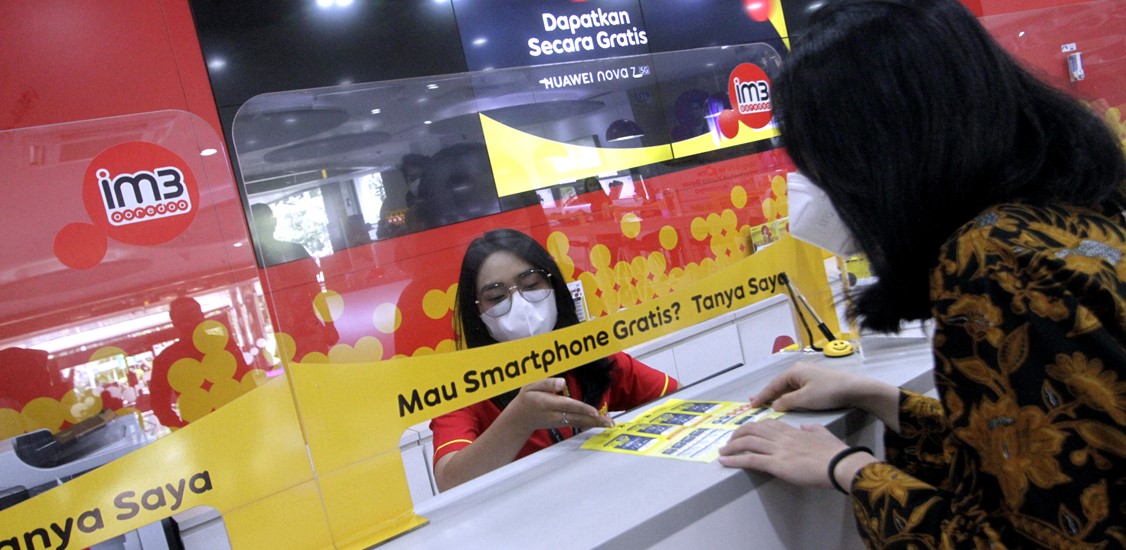In a recent interview with The Fast Mode's Executive Editor Tara Neal, Vikram Sinha, Director and COO of Indosat Ooredoo discussed Indosat's growth and developments over the previous year as well as their response to the COVID-19 pandemic. As the second largest mobile network operator in Indonesia, Vikram explores Indosat's 4G expansion plans, their advancements and the field trials carried out for technologies such as Open RAN, and the rollout of new and innovative services such as network-as-a-service (NaaS) and augmented reality (AR). Vikram also discusses the operator’s 5G readiness and plans as well as the variety of social initiatives it pioneers across Indonesia.
Tara: Can you share more on Indosat’s subscriber and revenue growth trends in the past few years? What are the major influencing factors contributing to these trends?
Vikram: This month Indosat Ooredoo announced outstanding Q1 2021 results, continuing our growth momentum from 2020. Due to the resilience and hard work of our employees and the support of our stakeholders we were able to deliver double-digit revenue growth, a strong EBITDA performance, and we also recorded a net profit.
This Q1 result has set a new benchmark for our financial performance. Our strategy to provide simple and relevant products, supported by our efforts in network excellence, has translated into an accelerating gain in cellular market share and a strong rebound in our enterprise business.
 Vikram Sinha, Director and Chief Operating Officer, Indosat Ooredoo
Vikram Sinha, Director and Chief Operating Officer, Indosat OoredooNavigating the past year has not been easy, but Indosat Ooredoo remains committed to network excellence and keeping our 60 million customers happy and connected during these tough times. As our customers have spent more time at home, we have helped them to adapt to working online, learning online and accessing services through our new digital products. Anticipating our customers’ needs has shown great results, and as we look to the future, we will continue to refine our strategies to support Indonesia’s transformation into a digital nation. But as our financial performance continues to improve, I always remind my team that we must stay humble and grounded and let the numbers do the talking.
Tara: What are Indosat’s key strategies for the mobile market?
Vikram: Given the accelerated use of digital technology, especially on mobile devices, we have realised the importance of having a strong network infrastructure and offering accessible user experience. For example, we witnessed total recharges made via digital channels jump from 20% to 40% within the last year.
To keep up with our customers’ shifting habits, we are investing close to US$2 billion since the beginning of our three-year plan into our network coverage and have been working hard to boost our 4G/LTE network and the Video Grade Network to provide improved internet services. The 4G network will continue to serve as our main growth driver as we believe that the potential of the 4G network is still enormous; Almost 30% of the Indonesian population are not connected to 4G yet. Additionally, we will continue to launch new innovative mobile products to ensure that communities remain connected and business remain operational amid a season of physical separation.
Tara: What is your take on Indosat’s brand presence in Indonesia, and how does it compare with its close competitors? What is the Indosat brand synonymous with?
Vikram: Indosat Ooredoo has been a trusted telecommunications provider in Indonesia for over 53 years. We were recently named the 6th fastest growing telecoms brand globally by Brand Finance Telecoms, and in 2020, our brand value witnessed a 31% increase.
The strength of the Indosat Ooredoo brand is very important and we work hard to ensure we always live up to that brand in the quality of service we provide to our 60 million customers. I am greatly encouraged by Indonesia’s confidence in our vision and product offerings and look froward to continuing to strengthen the Indosat Ooredoo brand in the years ahead.
Tara: Do you believe in constant innovation in the telecoms space? Can you share some examples of Indosat’s breakthrough products and services? How responsive has Indosat been in meeting the need for alternative digital services and solutions in the wake of the pandemic?
Vikram: Indosat Ooredoo is continually innovating and leveraging the latest technologies to deliver network improvements and develop new digital products and services. For example, Indosat Ooredoo became the first cellular operator in Indonesia to conduct OpenRAN (Radio Access Network) field trials in April 2021. OpenRAN technology will both reduce the cost of network provisioning and accelerate the expansion of our 4G network to the interiors of Indonesia.
Knowing that Indonesians would be forced to stay at home as a result of the pandemic, Indosat Ooredoo took immediate steps to strengthen our network to meet the anticipated spike in demand for data. As such, Indosat Ooredoo was also the first telecommunications operator in Indonesia to launch CloudConnect amid the COVID-19 pandemic. CloudConnect provides connectivity to Public Cloud using Network-as-a-Service (NaaS) concept, increasing the speed of network performance by up to 5 times compared to a regular alternative network.
Indosat Ooredoo also introduced relevant services such as CloudVoice, which allowed companies to use office telephone numbers from anywhere; Kios myIM3, which enabled the launching of businesses from the safety of a customer’s home; and a 30-day free data quota for students, which supported remote learning by providing access to free resources across 60 official e-learning platforms. Further, Hybrid Cloud and Big Data solutions were set in motion, enabling Indonesia’s government to monitor community activities and seamlessly roll out COVID-19 health protocols.
Indosat Ooredoo’s efforts in innovating and improving our telecommunications services have been recognized on multiple occasions. As a recent exmaple, Indosat Ooredoo won four awards at the 2021 Asia-Pacific Stevie Awards. Not only were Indosat Ooredoo’s innovative management, COVID-19 corporate response, market-leading digital products and services, and commitment to network excellence celebrated, but our President Director and CEO, Ahmad Al-Neama, also clinched a Gold Stevie Award for Innovative Management in Technology Industries.
Tara: How does a wider ecosystem comprising the right technology partners help operators such as Indosat deliver enhanced services to its subscribers? Can you share some recent examples of such partnerships?
Vikram: Telecommunications services rely heavily on digital technology, and over the last 12 months, Indosat Ooredoo has successfully partnered with global digital players like Facebook, Snap, Cisco, Google, Nokia, Huawei and Ericsson to fast-track digitalisation and deliver network improvements accross Indonesia.
To increase country-wide engagement and education, we partnered with Facebook to bring small unconnected villages online. We also recently announced an expanded partnership with Snap to accelerate the adoption of augmented reality (AR) in Indonesia. Multiple AR-focused programs, including webinars and competitions, will be launched over the next year to bridge the gap between the physical and digital world.
To boost the capabilities of our network, our partnerships with Cisco and Ericsson leverage the latest technologies to deliver energy- and cost-efficient solutions. For example, the launch of the Ericsson Operations Engine in July 2020 has allowed us to leverage Ericsson’s AI-based, data-driven automated network technology upgrades.
Tara: Can you elaborate more on some of Indosat’s social investment initiatives? How do they bridge the gap in technological knowhow and expertise among Indonesians? How do they deliver wider social outcomes for Indonesia?
Vikram: Indosat Ooredoo is committed to helping communities and supporting Indonesia’s transformation to a digital nation. To achieve these goals, our expertise and resources are divided across three CSR pillars: digital education, women empowerment, and the environment. In the past few years, IDCamp has become our flagship program within our digital education pillar. A program targeting Indonesian youth, IDCamp aims to minimise the gap between the skilled digital talent supply in Indonesia and industry needs. Furthermore, the program directly contributes to the government’s goal to produce 9 million new ‘digital talents’ by the year 2030 and make Indonesia a digital powerhouse. Since 2019, IDCamp has benefited more than 112,000 young Indonesian talents, including 1,318 persons with disabilities. Approximately 23% of participants have been women. In 2020, IDCamp was subsequently transplanted online, where 40,085 scholarships were distributed and 28,810 new developers were certified.
We are excited to continue growing the IDCamp program, not merely to help the Indonesian government achieve its goals, but also to build the digital competency of Indonesian young talents by expanding their access and opportunities to work in the technology industry.
Tara: Overall, what’s your view on the long term prospects for the Indonesian telecoms industry? Will there be any major shifts in the telecoms market, given the prolonged impact of the pandemic on the economy, locally and globally?
Vikram: First, the transition to an online lifestyle, expedited by the COVID-19 pandemic, will continue being key driver of growth in the global telecommunications industry for the next 2-3 years. Avenues of communication, ways of working, means of learning and accessing entertainment will continue moving online, therefore increasing the demand for innovative and relevant digital tools.
Second, the introduction of 5G will undoubtedly mark a major shift in both local and global telecommunications markets. 5G holds great potential to help industrialisation and the digital economy, and although 5G has yet to launch in Indonesia, we have already started preparations to ensure that Indosat Ooredoo is 5G-ready. For example, in 2019, we held a series of 5G technology showcase trials in partnership with Ericsson. Additionally, in 2020, in anticipation of the introduction of 5G-driven transport networks, we installed software-defined networking and Segment Routing IPv6 architecture powered by Cisco. With segment routing, the new network will have end-to-end network slicing and low latency capabilities, both of which are key 5G requirements.
It is an extremely invigorating time to be a key player in Indonesia’s telecommunications sector, and I am looking forward to working with Indosat Ooredoo’s partners to build new digital solutions for our customers in the years to come.





















